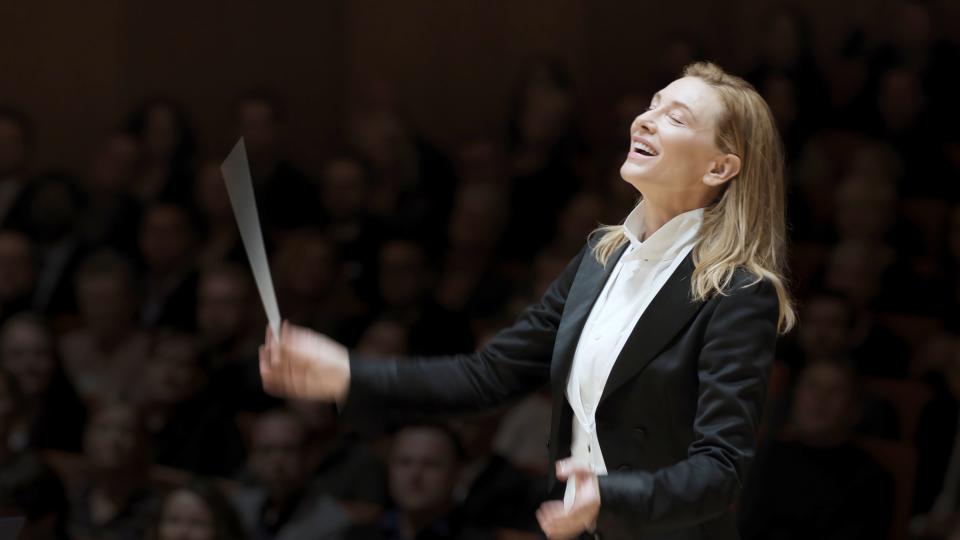When the lights come up on Tár, don’t be surprised if you leave the theater thinking that you’ve been watching a documentary rather than a fictional feature. Todd Field’s expansive, absorbing new drama — which opens in theaters on Oct. 7 after premiering at the Venice and New York film festivals — immerses viewers so completely in the life of classical music maestro Lydia Tár, played by Cate Blanchett, that the line between performer and character vanishes within the film’s first half-hour. And the Oscar-winning actress tells Yahoo Entertainment that reflected her experience making the movie as well. (Watch our video interview above.)
“The membrane became quite think, because the experience was so intense,” says Blanchett, who will likely earn another Best Actress nomination to add to her existing four nods. (She won that statue for her performance in 2014’s Blue Jasmine, and has three Best Supporting Actress nominations as well.) “It also had to do with the filmmaking: From the beginning, Todd wanted it to be very much fly on the wall. He wanted you to feel like you were not only inside the room with these people, but inside the minds and concerns of the characters.”
Field’s approach necessitated a demanding schedule, made all the more challenging by the short production time. “It was a short, sharp shoot, so we were often preparing the night before for things that were coming up at 6 a.m. the next day,” Blanchett recalls. “It was constant, but I felt very alive making the film. It was really exciting, so I can’t complain!”
Tár further blurs the lines between fact and fiction by rigorously exploring real world issues that are playing out in real time right now. When we first meet Lydia, she’s one of the most successful conductors in the rarefied classical musical world, with a prominent berth in front of a famous Berlin orchestra, a lucrative speaking career and a new book on the way. Things at home appear equally stable, as she’s happily married to her lead violinist, Sharon (Nina Hoss), and raising their young daughter.
But as the movie unfolds, subtle cracks appear in her life’s foundation — cracks that her own actions may have caused. On social media, accusations mount that Lydia has been “grooming” some of the young women in her orbit — including the orchestra’s new cellist, Olga (Sophie Kauer) — and edited videos emerge that depict her perhaps questionable lecturing methods. Essentially, she’s the subject of a slow-motion cancellation, and we watch the impact of so-called “cancel culture” play out through her eyes.
In the film, Field is careful to leave Lydia’s culpability in her downfall ambiguous, and he deliberately avoided answering that question in his own mind. “The impulse for writing the film was about a lot of questions I’d been pondering about power that I’d been unable to answer,” says the writer/director, whose previous films include the Oscar-nominated Little Children and In the Bedroom. “At the end of the day, that state of mind of asking questions about power and what I knew and what I didn’t know… is really what the film is about. So in terms of filling in any narrative certainty, that would be completely antithetical to why I wrote the script in the first place.”
Hoss says that she agreed with Field’s captivatingly ambiguous approach. “That’s what drew me to the whole story — there is no judgment. It is kind of vague, but those things are sometimes vague and we live in this world of social media, which is an added complication because you can fake things. What [the film] mainly does is raise questions so that we all start a conversation about it without having judged already. The film doesn’t make it easy for you to say, ‘Yeah, she did it’ or ‘No, she didn’t do it.'”
Because the film plays out almost completely from Lydia’s point of view, she naturally doesn’t believe she’s done anything wrong. Instead, as the person in power, she seems to subscribe to a school of thought suggested by her former teacher, who remarks that in the current climate: “To be accused is to be guilty.” Asked about the larger importance of that particular piece of dialogue, Blanchett notes that it ties into the movie’s larger exploration of power.
“We live in a world where ‘cancel culture’ is on everyone’s tongue,” she says. “So when you make a movie now, that’s part of the texture of any movie that’s made. I think it’s much more a meditation on power itself and who is culpable in maintaining those systems of power and what happens to the human beings when they come very close to the flame of power and how complicated that is.
“Of course, it’s set in the classical music world, and she is a musician extraordinaire, but she could equally have been an architect or the CEO of a major banking corporation,” Blanchett continues. “The fact that she’s female allows us to have much more nuanced conversations around the nature of power and the corrupting nature of power. She’s somebody who has struggled to get where she is, who is incredibly gifted and is now running an institution as much as she is being an artist within that institution. That is a really complicated place to be, and that’s what’s great about the film — because it doesn’t provide any easy answers.”
Field’s script pointedly references the recent cases of two real-life classical music superstars — former Metropolitan Opera music director James Levine and opera singer Plácido Domingo — both whom lost prominent positions following multiple sexual harassment allegations. Kauer, a professional cellist who is making her acting debut in Tár, says that it’s important to see powerful people in her industry held accountable for their actions.
“The Incorporated Society of Musicians just released a study in which they said that sexual harassment, bullying and racism is at an all-time worst in the classical music industry,” Kauer says. “People feel like they can’t speak up, especially after the pandemic, because they feel like they’ll face repercussions. I really think that the release of this film is perfect timing. People are finally starting to talk about these things and until we fix them, loads of people are going to be vulnerable to these horrific conditions.”
Tár also includes a brief cameo by another celebrity whose career has been impacted by high-profile accusations. Early on in the film, we hear a clip from a radio interview between Lydia and Alec Baldwin, who hosts his own NPR interview show, Here’s the Thing. Last year, Baldwin was on the set of the film Rust when cinematographer Halyna Hutchins was killed by a live round fired from Baldwin’s prop gun. The actor was at the center of the ensuing investigation, and faces possible criminal charges. He has since reached a settlement with Hutchins’s family that will allow filming on Rust to continue.
“Alec Baldwin has a show called Here’s the Thing, which is a fine show with wonderful conversations and is something that I’ve listened to for a very, very long time,” Field says when asked if he considered removing Baldwin’s cameo from the film in light of the Rust allegations. “That conversation between Alec and Lydia Tár was in the script a long time ago, and I was thrilled when he agreed to do it. And I’m thrilled that he’s in the film.”
Because it avoids easy answers about cancel culture and what should happen to powerful people accused of wrongdoing, Blanchett knows that audiences will come out of Tár eager to discuss the film and even more eager to see it a second time.
“We’ve heard that people want go back and see the movie again, because there’s so much to talk about,” she says. “That’s really rare, and that’s why you need to see it in the cinema, because the questions it asks are epic. It’s not just a small question about cancer culture. It’s much more kind of Greek than that.”
As for whether she’s been able to let go of Lydia now that the film is out in the world, Blanchett admits that she still feels “changed” by the experience. “But I also feel changed by the last three years of human history in a very strong way,” she adds. “We think about Black Lives Matter and #MeToo, and already those have become pejorative terms when we haven’t even processed what that change means. This film, to me, feels part of that same churn. I feel that there’s still questions in there that I haven’t even begun to grapple with.”
— Video produced by Kyle Moss and edited by Jason Fitzpatrick
Tár premieres Friday, Oct. 7 in theaters




